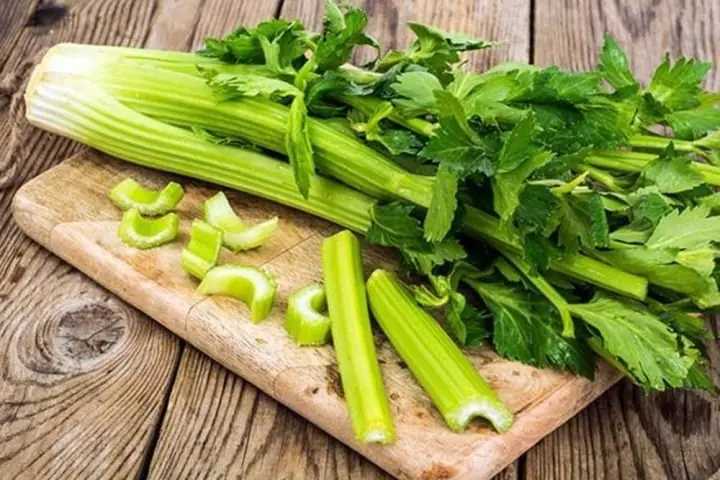
Doctor’s Warning: Avoid Eating Celery with These Foods – It May Harm Your Health, and Many People Don’t Know It

Celery is a beloved vegetable, commonly found in supermarkets and kitchens worldwide. It is not only delicious but also highly nutritious. Regularly incorporating celery into your meals can provide numerous health benefits.
However, while celery is a versatile and healthy food, there are certain food combinations that should be avoided. Pairing celery incorrectly with other ingredients may negatively impact your health.
The Nutritional Value of Celery
Celery is packed with essential nutrients. Per 100 grams of celery, you’ll find:
- 61mg phosphorus
- 8.5mg iron
- 2.2g protein
- 8.5mg calcium
Celery contains nearly twice the protein of many other vegetables and 20 times more iron than tomatoes.
Additionally, celery is rich in beta-carotene, vitamins, and minerals, which help support overall health. It also contains mannitol, a compound known to stimulate appetite, and flavonoids, furocoumarins, and organic acids, which contribute to its unique flavor and health benefits.
4 Potential Health Benefits of Eating Celery Regularly
1. Supports Eye Health
Celery is rich in beta-carotene, which is converted into vitamin A once absorbed by the body. Vitamin A is essential for preventing night blindness and dry eyes.
Since beta-carotene is fat-soluble, it’s best to cook celery with a small amount of oil to enhance absorption.
2. Helps Regulate Blood Sugar
With the increasing prevalence of diabetes and high blood sugar levels, celery can be a helpful dietary addition.
Celery is high in dietary fiber, which forms a protective layer in the stomach, slowing down digestion and reducing glucose absorption. This makes it a good option for people with diabetes or those at risk.
3. Aids in Weight Loss
Celery promotes a feeling of fullness, helping to reduce calorie intake. It also boosts metabolism and enhances fat burning, making it a great addition to a weight-loss diet.
4. Improves Skin Health & Detoxifies the Body
Celery is hydrating and high in fiber, which supports gut health, improves digestion, and helps flush out toxinsfrom the body. This detoxifying effect can reduce skin issues such as acne and inflammation, leading to a healthier complexion.
Additionally, celery reduces liver heat, which may help in balancing hormones and improving skin clarity.
Doctor’s Warning: Avoid Eating Celery with These Foods
1. Ginger
Ginger is widely used for enhancing flavors and reducing unpleasant food odors, but it should not be paired with celery. The combination can create a bitter taste and may lead to digestive discomfort.
2. Cucumber
Cucumbers contain an enzyme that breaks down vitamin C. Since celery is rich in vitamin C, eating it with cucumbers reduces its nutritional value. To preserve the benefits of celery, avoid pairing it with raw cucumbers.
3. Milk
Celery and milk don’t mix well. The calcium in milk reacts with oxalic acid in celery, forming calcium oxalate, which is difficult for the body to absorb.
Additionally, fiber in celery can interfere with milk digestion, potentially causing bloating or diarrhea.
4. Seafood
Many people unknowingly eat celery after consuming seafood, but this is not recommended. Shellfish and other seafood contain an enzyme that breaks down vitamin B1.
When eaten with celery, the vitamin B1 in seafood is significantly reduced. If you must pair celery with seafood, adding vinegar can help preserve vitamin B1, but note that excessive vinegar consumption may harm tooth enamel.
5. Rabbit Meat
Celery and rabbit meat should not be eaten together because rabbit meat contains a type of acidic compound that reacts with certain substances in celery. This interaction can negatively affect hair health and may even contribute to hair loss.
6. Chrysanthemum Tea
Chrysanthemum tea is known for its cooling and detoxifying properties, but when combined with celery—which is also a cooling food—it can disrupt digestive function. This may lead to diarrhea or indigestion, especially for individuals with sensitive stomachs.
7. Chinese Toon (Xiangchun)
Chinese toon is rich in antioxidants, vitamin C, and fiber, but should not be eaten with celery. The enzymes in celery break down the vitamin C and antioxidants in Chinese toon, reducing its nutritional benefits.
This can impact hormone balance and nutrient absorption, decreasing the effectiveness of both foods.
4 Important Things to Know About Eating Celery
1. Don’t Throw Away Celery Leaves
Celery leaves are rich in beta-carotene and vitamin C, which are essential for immune function and overall health. Instead of discarding them, use the leaves in salads, soups, or stir-fries.
2. Limit Salt When Cooking Celery
Celery naturally contains sodium, so adding too much salt can increase sodium intake, which may contribute to high blood pressure. For those looking to lower their blood pressure, reduce or skip added salt when cooking celery.
3. Avoid Eating Celery with Vinegar
Vinegar is highly acidic, and when paired with celery, it can accelerate calcium loss, potentially harming teeth and bones. Over time, this could lead to calcium deficiency and weakened joints.
4. Men Should Consume Celery in Moderation
Studies suggest that celery may lower sperm count, so men who are planning to conceive should limit their intake. While occasional consumption is fine, excessive intake may impact fertility.
Conclusion
Celery is an incredibly nutritious vegetable, but it’s important to eat it correctly to maximize its benefits. Avoid pairing celery with incompatible foods, and maintain a balanced diet to support overall health.
By being mindful of food combinations, you can enjoy the full nutritional benefits of celery while protecting your well-being.
Make informed food choices and enjoy a healthier diet! 🥗
News in the same category


If Your Kidneys Are in Danger, Your Body Will Send You These 8 Signals — Don’t Ignore Them

The Surprising Effects of Avocado on Your Heart and Brain

Natural Remedy for Cataracts and Eye Inflammation: Restore Your Vision Naturally

Unlock the Golden Magic of Corn Silk Tea

9 Powerful Home Remedies to Get Rid of Fungal Infection (Daad, Khaj, Khujli) Fast

7 Shocking Health Benefits Of Eating Sweet Potatoes Every Day — According To Science

About 15 Minutes Before a Stroke, the Body Often Sends 4 Clear Warning Signs — Call Your Loved Ones Immediately

Hidden Dangers in Your Mouth: Early Signs of Oral Cancer

The Secret Power Of The Herb That Helps You Age Gracefully

The Unexpected Benefits of Eating Chicken Feet

If You See Someone with “Blue Veins,” Tell Them This — It Could Save Their Life

The Secret Power of Two Eggs a Day: Could This Simple Habit Transform Your Health? Buy vitamins and supplements

Man Passed Away After Eating Eggs — Stop Eating Eggs This Way Immediately

8 Foods That Fight Tumors — Eat Them Regularly

Does Eating Bananas Before Bed Have Any Benefits?

The Tongue as a Health Indicator: Meaning of a Whitish Color

Benefits of Boiled Eggs: Nutrition and Healthy Recipes

5 early warning signs of cervical cancer

7 Innocent Mistakes That Get Your Kidneys in Big Trouble
News Post

WHAT HAPPENS WHEN WE TONGUE KISS…See more

Nature’s Secret: 4 Healing Leaves That Support Metabolism, Immunity & Circulation Naturally

Don’t Drink Coconut Water Before You Know These 11 Secrets!

Pumpkin Seed Milk — The Natural Parasite Cleanser

Fast Rice Water Trick for a Brighter Smile

Morning Drink to Revive Your Kidneys Fast

The Onion Recipe That Could Transform Your Blood Sugar, Support Cleaner Arteries, and Protect Your Heart!

Top 4 Fruits That Help Your Kidneys Flush Out Toxins While You Sleep

Ginger, Clove, and Honey: The Natural Trio Your Body Will Thank You For

Heal 15 Years of Joint Pain Naturally with Turmeric and Honey Tea

This Juice Revived My Grandma’s Energy — Say Goodbye to Fatigue and Body Pain with This Natural Recipe

The Benefits of Eating 2 Boiled Eggs Every Morning: Transform Your Health!

If Your Kidneys Are in Danger, Your Body Will Send You These 8 Signals — Don’t Ignore Them

The Surprising Effects of Avocado on Your Heart and Brain

Ways to Get Over a Man Who Didn’t Value You

I’m 66 but Look 36 — My Secret? Aloe Vera & Ginger for Firm, Smooth Skin

How to Make Okra Water to Treat 17 Health Problems Naturally

Banana and Egg Mask to Look Younger Even in Your 80s

Scent Leaf Secrets Unveiled: 10 Surprising Health Benefits of This Miracle Herb
